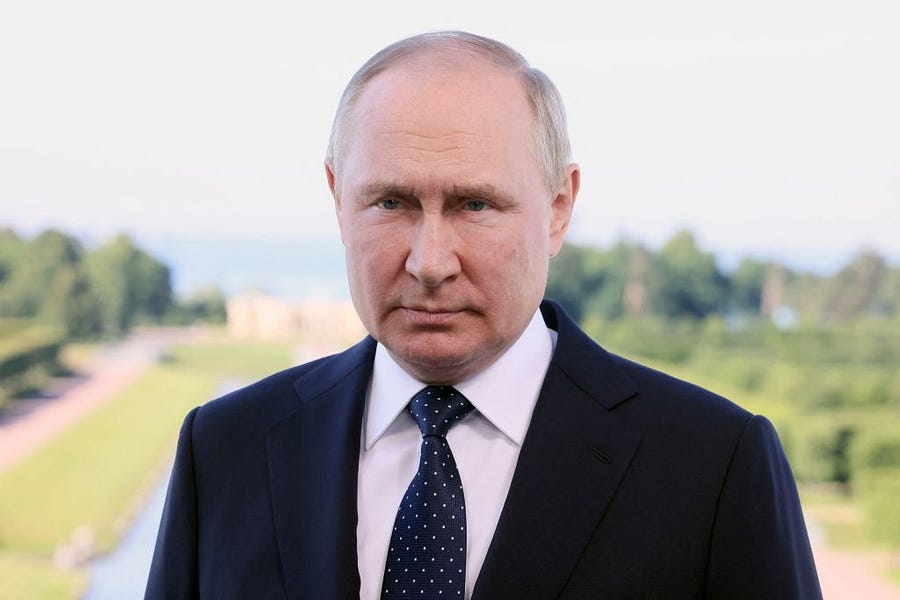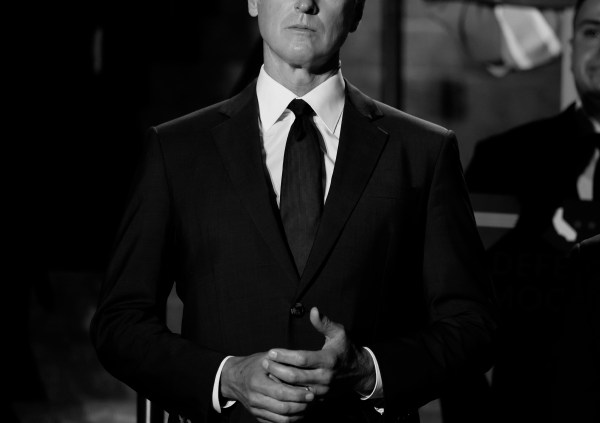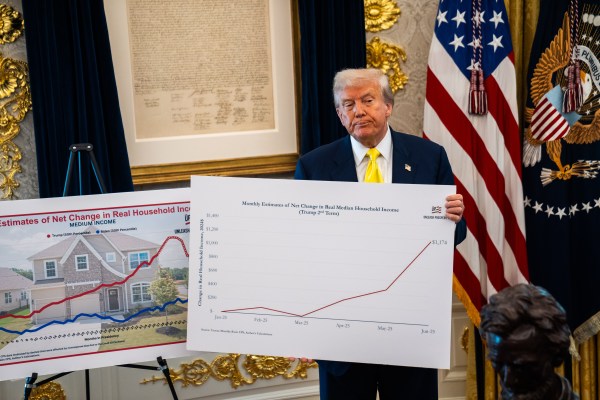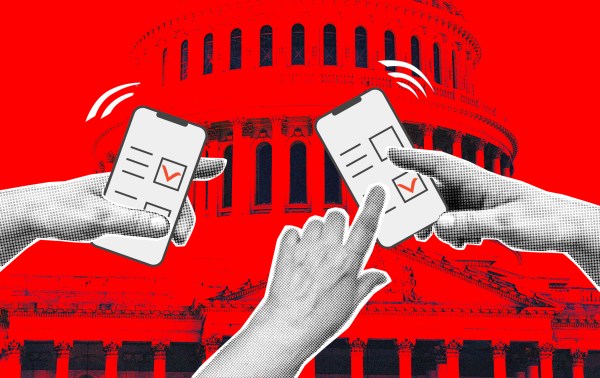On July 7, Vladimir Putin addressed a meeting with the leadership of the Duma, the Russian parliament. This speech got the attention of the international press, more than usual, and it was probably designed to do so, with Putin blustering about how he has not even begun to fight in Ukraine. Aside from that, some language he used was notable for what it might tell us about the kinds of allies he is seeking in the West. By making several references to globalism, he appears to be doubling down on courting Western right-wingers, and he may be about to make “globalist” part of the official vocabulary for his external as well as internal propaganda.
Here are the two relevant sections of the speech, with a bit of context. (You can read the full speech in English translation here on the Kremlin’s official website.) First, in a section where Putin gives the reason for the “conflict” (in this case, a Western attempt to “move on to a new stage in the fight against Russia”) he declares that the West has already lost:
“because this operation also means the beginning of a radical breakdown of the U.S.-style world order. This is the beginning of the transition from liberal-globalist American egocentrism to a truly multipolar world based not on self-serving rules made up by someone for their own needs, behind which there is nothing but we striving for hegemony, not on hypocritical double standards, but on international law and the genuine sovereignty of nations and civilisations, on their will to live their historical destiny, with their own values and traditions, and to align cooperation on the basis of democracy, justice and equality.” [Emphasis mine.]
Then a little later in the speech, Putin discusses the behavior of U.S. allies—or, as Putin calls them—“countries that are still satellites of the United States,” he castigates “their ruling elites’ blind obedience to their overlord” which “does not necessarily coincide with their national interests, and most often simply and even radically contradicts them.” He attacks these “ruling elites” as “globalist”:
“Today, these ruling elites are raising the degree to which they manipulate the public consciousness right before our eyes. The ruling classes of the Western countries, which are supranational and globalist in nature, realised that their policies are increasingly detached from reality, common sense and the truth, and they have started resorting to openly despotic methods.
The West, which once declared such principles of democracy as freedom of speech, pluralism and respect for dissenting opinions, has now degenerated into the opposite: totalitarianism. This includes censorship, media bans, and the arbitrary treatment of journalists and public figures.
These kinds of prohibitions have been extended not only to the information space, but also to politics, culture, education, and art—to all spheres of public life in the Western countries. And, they are imposing this on the world; they are trying to impose this model, a model of totalitarian liberalism, including the notorious cancel culture of widespread bans.” [Emphasis mine.]
There is not a single reference to “Nazis” or “fascists” or any of Putin’s other favorite phrases he uses when discussing his war in Ukarine, like “external control” or “external management” or the “golden billion” or how Ukraine was supposedly about to construct some kind of nuclear or radiological weapon. He does not even mention NATO or NATO expansion, a typical line Putin and his propagandists like to feed especially to Western audiences. These omissions might all be in the interest of time and to preserve his listeners’ attention, but again, he has not often used “globalist” or related words.
In recent years the terms “globalist” and “globalism” and their cognates have shown up with increasing frequency in Western right-wing articles, books, speeches, and of course in online comments sections. Earlier, “globalist” spread among those who feared the effects of globalization. Back in the 1990s, Patrick Buchanan warned that big business interests were crushing U.S. industry by dominating both U.S. political parties and getting them to both support free-trade policies. “Within both parties,” he wrote in 1998, “nationalists are now in rancorous conflict with the globalists.” Still more recently the word “globalist” has taken on all kinds of nefarious connotations, imparting a vague sense of unpatriotic elites who are damaging the U.S. for their own gain. At the 2019 U.N. General Assembly, President Donald Trump declared:
“If you want freedom, take pride in your country. If you want democracy, hold on to your sovereignty, and if you want peace love your nation. Wise leaders always put the good of their own people and their own country first. The future does not belong to globalists, it belongs to patriots. The future belongs to sovereign and independent nations who protect their citizens, respect their neighbors, and honor the differences that make each country special and unique.” [Emphasis mine.]
Does Putin fit the description of a “patriot” who is against the “globalists”? He goes on and on about sovereignty, sure, but what about respecting neighbors? Does Putin show respect for his neighbors by rocketing them and letting his troops flow in to loot and rape and murder?
What does Putin mean by “globalist”? I have searched in all the usual places, and perhaps I have missed some occasion, but it appears that Putin has not used this word or any variant of it before the summer of 2022 (apart from an answer to a reporter’s question in 2018, where Putin seemed to be using the term “globalism” as a stand-in for globalization—mostly the of economic kind.) Fortunately for us Putin recently used the term “liberal globalism” and gave a succinct definition. This was during a speech on June 30 to veterans of Russia’s foreign intelligence service, celebrating the 100th anniversary of Russia’s “illegals” spy program (deep cover agents). Here is his definition, in the middle of an attack on the West:
the so-called collective West … in its own actions proceeds from the idea that there is no alternative to its model of liberal globalism. Essentially, this model is just an updated rendition of neocolonialism and nothing else. It is a world the American way, a world for the chosen where everybody else’s rights are simply trampled upon.
So Putin says that “liberal globalism” is just updated neocolonialism. Now neocolonialism, and updated neocolonialism, is something that Putin and his cronies have said a lot about. The evil American empire is forcing its will on the world under the guise of international institutions, alliances, and “human rights.” This definition gels perfectly with Putin’s statements in his July 7 speech—referencing “liberal-globalist American egocentrism.” The definition of globalism that Putin holds out is very much at odds with the one espoused by Buchanan and Trump and others. Putin describes the globalist elite as those working in the interests of the U.S. (or, most charitably, in the interests of the U.S. elite), and making their countries into colonial dependents of the U.S. In his 1998 book The Great Betrayal, Buchanan bemoaned that the “globalists had reverse-engineered American history, inaugurated a new era of American dependency,” while Putin is angry that the elites of other countries have made themselves dependent on the U.S. Putin’s regime has tried to use its influence and propaganda to stop the fracking revolution in the U.S. all while boasting about fostering the dependence of the world on Russian energy exports. (This is an increasingly common reason given why other countries should let Putin destroy Ukraine—we gotta keep those prices at the pump low!)
Many on the right in the West, especially in America, will lap up Putin’s talk of “globalists” and “globalism” as the enemy, and even use it to explain Putin’s invasion of Ukraine. They will continue to seek common cause with this unreconstructed KGB agent. Believing they have something in common—the same “globalist” enemy, aka the Western “elites”—they can create ideological alliances based on perceived common enemies and shared vocabulary.
In his speech, Putin emphasized “that we have many supporters, including in the United States and Europe, and even more so on other continents and in other countries. And there will be more.” Putin would be happiest if the U.S. was totally deindustrialized, if our natural gas and oil fields disappeared (or were capped by environmentalists), and if our allies all deserted us and our military totally destroyed. He has taken and will take concrete steps towards the goal of harming U.S. interests—even U.S. interests as defined by a very strict very Trumpy “nationalist.” And Putin’s complaints about cancel culture and censorship are self-evidently hypocritical. In Russia if you fall afoul of the powers that be and merely become ostracized and lose your job, you should count yourself lucky. You might end up in a labor camp, perhaps after you survive an assassination attempt. And as for censorship, please. Russian censorship was already over-the-top before the war, now it is over-the-top and around the bend. Nevertheless, there will be still more convergence and sympathy between many opponents of cancel culture in the West and Putin and his thuggish regime.
This brings to mind the way leftists in the U.S. and the West more often supported the USSR during the Cold War. The leftists of the 20th century might have known about the brutal persecution Mensheviks, the Jewish Bund, and Socialist Revolutionaries faced, the crushing of the Prague Spring, the repression of any independent trade union movement, but at least the Soviets weren’t reactionary. Many leftists in the West would call the Soviet puppet regimes “democratic peoples’ republics” with a straight face, despite the fact that the elections were fixed and the opposition murdered or thrown into gulags, including—and even especially—the socialist opposition. Intellectuals who considered themselves champions for free speech and minority rights and against police brutality were enthusiastic and emotional cheerleaders for one for the most censorious, oppressive, and thuggish regimes on earth.
The Soviets maintained their reputation on the left with propaganda that encouraged left-wingers to see the USSR as an ally against the capitalist elite—the “establishment”—that Western leftists saw as their enemy. For example, the Soviets railed against the “imperialism” of the U.S. supporting South Korea and South Vietnam but described the invasion of Czechoslovakia in 1968 as anti-imperialist.
Many leftists saw through this charade or came around after the USSR turned on them or their friends (like Orwell and many other Trotskyists), but this Soviet propaganda program was on the whole successful, and we are still dealing with this today. Take a look at most far-left news sites or listen in on what Noam Chomsky and those like him have to say—they are very often quite pro-Russian and anti-Ukrainian. (Often this is because they still repeat the idea that any free country is an extension of America’s empire—as Putin would call it, American neocolonialism.) Suggesting this propaganda program targeting the Western left is over would give the wrong impression. I started watching Russian propaganda closely back in the mid-2000s, and during the Bush years I considered RT (then known as Russia Today) to be generally left-wing. Russia has a dedicated propaganda source churning out left-wing pro-Russian propaganda, it is called Redfish.
It seems to be an unfortunate part of human nature that we prioritize our near “enemies” over our far enemies. There are probably old biological reasons for this, but these days it is leading to folks lionizing people who want to turn our country into radioactive ash in order to “own the libs” a little bit harder. Today’s self identified “anti-globalists” on the American and European right might know about the rape of Bucha, Putin’s deliberate creation of waves of Syrian refugees bound for Europe, the brutal murder of Christian pastors in Ukraine by Putin’s goons. Those in the know might even have some inkling of the support that Russian propaganda outlets still give to far left causes—but at least Putin isn’t a globalist. For some, it is enough to see that the “liberal elites” are in favor of something—the “current thing”—to justify turning against it. (In this case, the “current thing” is the survival of Ukraine.) Instead of being happy that the libs have finally decided to be against the Russians this time, that heuristic demands that the right suddenly become pro-Putin. Putin is intent on painting Russia as the champion of nationalists even while trying to brutally crush a different nation—to say nothing of Russia’s continued domination of the nations still in its empire that contribute disproportionately to Russia’s army, like the Buryats, Dagestanis, etc.
If there is any nation that deserves the title “nationalist” or “patriotic” in Europe right now, it is Ukraine. The Ukrainians are making immense sacrifices to defend their nation. Is one against nation building? Ukraine is a nation already built, and Putin is trying to tear it down. You want to talk about getting rid of corrupt elites who work against the national interests of the people? The Ukrainians really did that in 2014 in a major way, and have been defending their gains since then against the Russian imperialists since then.
Putin’s discussion of globalism might be new, but it is not emerging out of nowhere. This is an effort years and years in the making, an effort to woo the Western right wing just as the Soviets successfully seduced the Western left. This adoption of “globalist” into the official vocabulary of the justification for its invasion of Ukraine may play an important part in building up a permission structure for right wingers to support Putin even more; to ally and even accept help from him. Perhaps it is a good sign in terms of how the war is going—that Putin needs to start building a justification that crosses over both internal and external propaganda in order to fight a long war of attrition. (The war was supposed to be over in days.) In terms of how it will affect the right-wing in the U.S., I am not optimistic that the U.S. and European right will reject the blandishments of this Soviet thug who tells them what they want to hear, even if he is still doing the same to the left.
Andrew Fink received his Ph.D. from the law school at Leiden University in 2020 on the history of propaganda, conspiracy theories, and violent extremist ideologies.






Please note that we at The Dispatch hold ourselves, our work, and our commenters to a higher standard than other places on the internet. We welcome comments that foster genuine debate or discussion—including comments critical of us or our work—but responses that include ad hominem attacks on fellow Dispatch members or are intended to stoke fear and anger may be moderated.
With your membership, you only have the ability to comment on The Morning Dispatch articles. Consider upgrading to join the conversation everywhere.